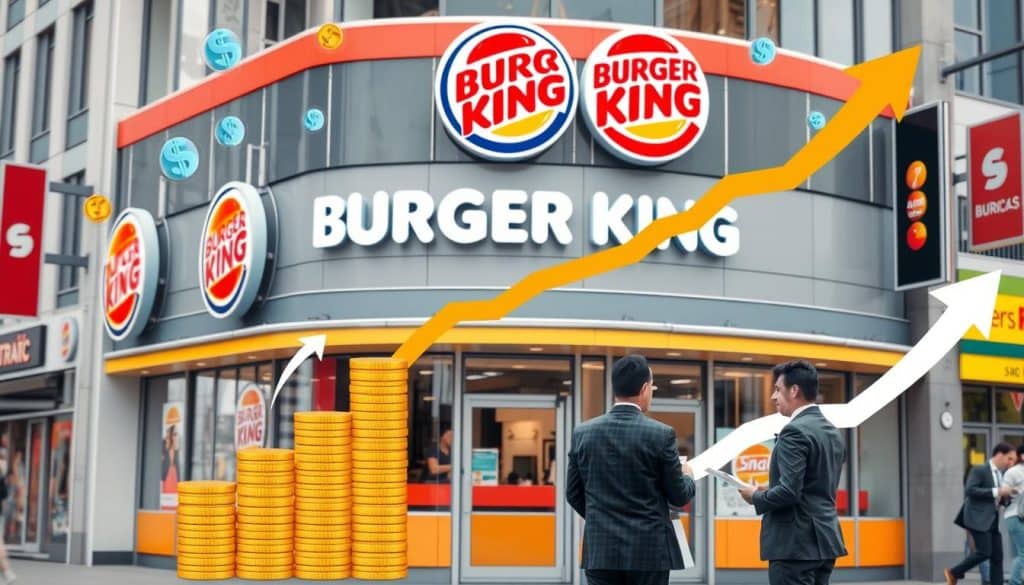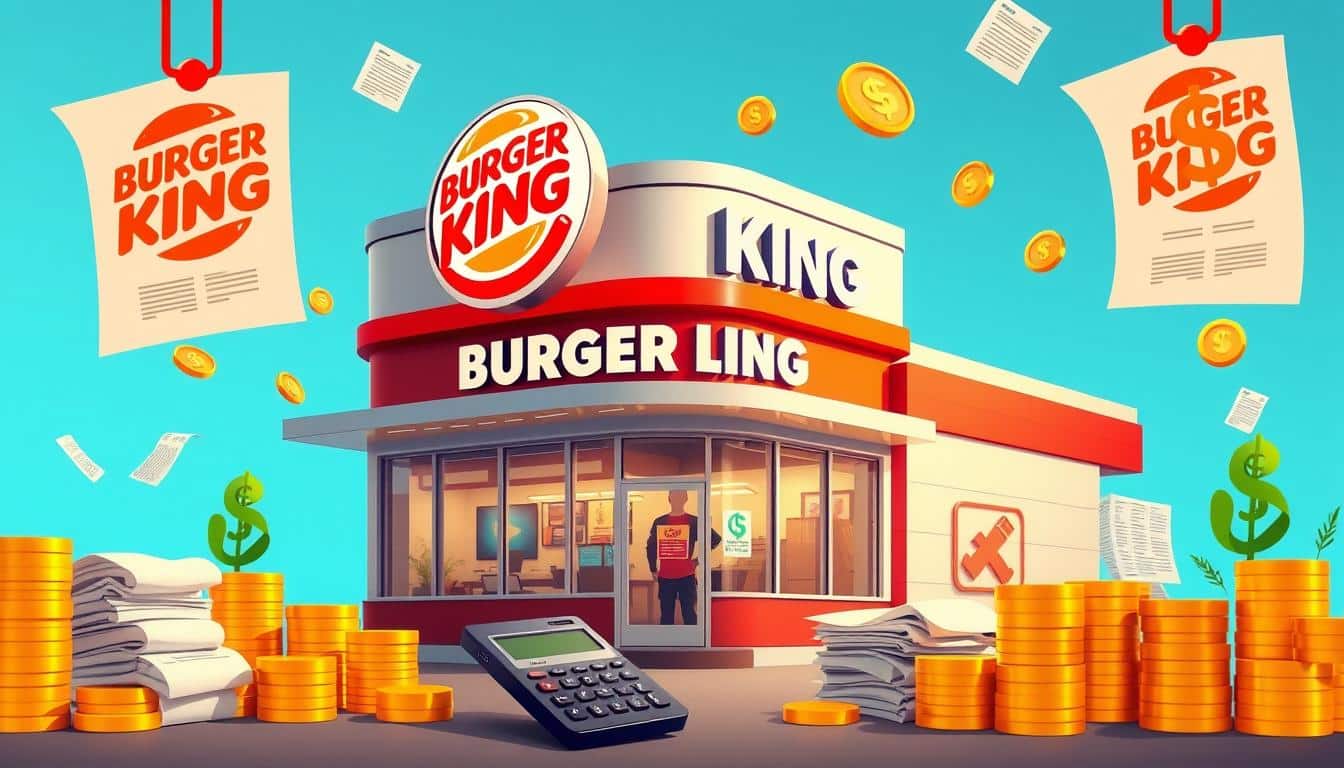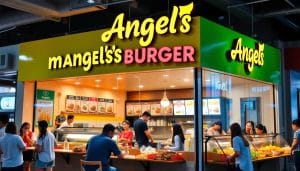Thinking about a Burger King franchise? You might be surprised by some hidden Burger King franchise costs. The brand is well-known and has a loyal customer base. This makes Burger King franchise opportunities very appealing, with the chance to make a lot of money.
But, it’s important to know all the costs involved. This includes the initial investment, ongoing fees, and how to finance it. We’ll look at all these details to help you decide if Burger King is right for you.
Key Takeaways
- Burger King franchises require an initial investment ranging from $2,010,600 to $4,670,900.
- Franchisees typically need $500,000 in liquid assets and a minimum net worth of $1.5 million.
- The three-year failure rate for Burger King franchises is 9%, which is lower than the industry average.
- Franchises generate an average of $1.4 million in annual sales per unit.
- Burger King’s extensive support system assists franchisees in marketing and operational strategies.
- Potential growth opportunities exist within the fast-food sector, for brands like Burger King.
- Understanding ongoing fees and royalties is key for financial planning and success as a franchisee.
Overview of Burger King Franchise Opportunities
Burger King has a long history and is growing with exciting burger king franchise opportunities. It started in Miami, Florida, with new ideas like drive-thru services. Now, it’s known for its tasty food and wide appeal.
History of Burger King
Burger King began in 1954 and changed the fast-food scene. The Whopper, launched in 1957, became a huge hit, selling billions worldwide. Burger King keeps up with trends, like the Impossible Whopper, to attract more customers.
Current Market Position
Now, Burger King is the second-biggest fast-food chain, with about 19,000 restaurants. It welcomes over 11 million customers every day in more than 100 countries. Its parent company, Restaurant Brands International, has a huge market value, supporting its franchisees.
More than 60% of Burger King restaurants are outside the U.S., showing its global success. It offers franchises for different groups and places, aiming for steady growth.
For more info on starting a franchise, check out Burger King’s franchise page.
Initial Investment Required for a Burger King Franchise
Starting a Burger King franchise requires understanding different costs. The investment can be between $2,010,600 and $4,670,900, as stated in the Franchise Disclosure Document (FDD). This money covers important parts that new franchisees need to plan for.
Breakdown of Startup Costs
The initial fee is $50,000, a key cost before you start. A big part of the costs goes to real estate, which can be up to $1.5 million. You also need money for equipment, signs, decorations, and working capital.
Choosing the right location is key. It affects how much money you make and your success in the long run.
Real Estate Considerations
Real estate is a big factor in the costs of a Burger King franchise. Lease rates vary from $60,000 to $100,000 a year, based on location, size, and competition. Urban areas often have higher rates because of more foot traffic.
Rural areas might have lower costs. So, it’s important to research real estate options carefully. This helps new franchisees make the most of their investment and get good returns.
Ongoing Fees and Royalties for Franchisees
Starting a Burger King franchise means knowing about ongoing costs. These costs affect how much money you can make. Franchisees pay fees to keep the brand strong and to advertise.
These fees include a percentage of sales, called burger king franchise royalties. They also include money for advertising. This helps make the brand more visible in the market.
Royalty Structure Explained
The royalty fees for Burger King franchises are between 4% and 5% of sales. This money helps with running the business and growing the franchise. It’s a big commitment, but it helps franchisees use Burger King’s well-known customer base.
With about 11 million customers every day, the brand is strong. The failure rate is also low, at 9% over three years. This shows the royalty structure works well.
Advertising Contributions
Franchisees also pay for burger king advertising contributions. This is about 4% of monthly sales. This money helps fund big marketing campaigns.
It makes the brand more known. This helps franchisees get more customers and sell more. Strong branding and ads are key to success.
Financing Options for Burger King Franchisees
Prospective owners of Burger King franchises have several financing options to consider. They can look into traditional bank loans or SBA loans made just for franchisees. Each option has its own benefits, fitting different financial needs.
Traditional Bank Loans
Many choose traditional bank loans for their franchises. To get one, you need a detailed business plan and collateral. This shows lenders you’re serious and can handle the investment.
Getting a loan is tough, but it can offer good rates and terms. You must prove you’re financially stable and know how to run a business.
SBA Loans
SBA loans are great for those wanting better terms. They require less money down and offer flexible payback plans. The Small Business Administration backs these loans, making them safer for lenders.
To qualify, you need at least $500,000 in liquid assets. This shows you have the money and stability for a successful franchise.

Factors Influencing Burger King Franchise Costs
The costs of a Burger King franchise depend on several key factors. The location is a big factor, as costs can differ greatly. Franchisees need to know the area’s demographics well.
High-traffic urban areas have higher costs but also more sales. This is important for franchise owners to consider.
Location and Demographics
When setting up a Burger King, the demographics matter a lot. Things like population density and income levels affect sales. Finding the right location is critical for success.
Size and Format of the Restaurant
The size and type of restaurant also impact costs. Burger King offers different sizes, from standalone to compact. Each size has its own costs and profit margins.
Understanding these can help owners make better choices. It’s key to know this before investing.
Comparative Analysis of Burger King and Competitors
Looking at the fast-food world, we see Burger King stand out. It has unique costs and fees for franchises. The fees are between $45,000 to $60,000 a year, catching the eye of those interested in starting a franchise.
Comparing Costs with McDonald’s
In a burger king costs vs mcdonalds look, big differences show up. Burger King starts at $232,000 to $4.52 million, while McDonald’s is $521,000 to $2.5 million. McDonald’s might cost more, but owners can make more money. McDonald’s owners can earn up to $660,531 a year, more than Burger King’s $270,283.
Other Fast-Food Franchise Fees
When we compare burger king franchise fees to others, we find interesting facts. McDonald’s has similar marketing fees but a lower royalty fee of 4%. Other brands like Wendy’s or Taco Bell have different costs. This shows the fast-food market has many financial paths, helping franchisees choose the right brand.
Benefits of Investing in a Burger King Franchise
Investing in a Burger King franchise is a great chance for entrepreneurs to enter the fast-food world. It offers more than just a well-known brand. It also gives access to a wide market and loyal customers. With about 11 million customers every day, Burger King has a dedicated fan base that boosts sales.
Brand Recognition and Loyalty
The Whopper, introduced in 1957, is a key part of Burger King’s appeal. It keeps attracting customers, making the brand strong. With over 6,600 units in the U.S., Burger King’s popularity is clear, making it a solid investment.
Comprehensive Support System
Burger King provides a lot of training and help to its franchisees. They get the tools and knowledge needed to succeed. The detailed manuals and field support help them face daily challenges. This strong support system increases the chance of making a profit, with a failure rate of just 9%.
Potential Challenges for Franchisees
Starting a Burger King franchise comes with its own set of challenges. Prospective franchisees need to know about these hurdles. They include dealing with complex operational issues that affect daily work.
Managing staff, keeping food quality high, and making customers happy are key. If these challenges aren’t met, the brand’s reputation and profits can suffer.
Common Operational Issues
Franchisees face many operational problems in Burger King restaurants. Finding and keeping good staff is a big challenge. The fast pace of the quick service industry demands skilled workers.
Training issues and high staff turnover can hurt service quality. This affects how customers feel about their experience. Also, dealing with supply chain problems requires quick thinking and planning.
Navigating Corporate Regulations
It’s important for franchisees to understand Burger King’s corporate rules. These rules can change often. They cover food safety, marketing, and more.
Not following these rules can cost money and harm relationships with corporate leaders. Staying informed and following these guidelines is key to success.

The Process of Becoming a Burger King Franchisee
Starting your journey to open a Burger King franchise begins with an application. You’ll need to show you have the money, with a net worth of at least $1 million and liquid assets of $500,000. The cost to start can be from $247,000 to almost $4.67 million. So, it’s key to get your finances in order.
Initial Application Steps
When you apply, you’ll share personal info, financial details, and a business plan. The Burger King team will then review your application carefully. They check if you’re a good fit for the brand and if you’re ready to run a franchise.
Evaluation and Approval Process
Those who pass the first check move on to more detailed evaluations. This includes looking at your finances and meeting with you in person. They want to make sure you’re serious and can handle the Burger King brand.
If you pass, you get the green light to start your franchise. Then, you’ll go through a training program. It covers how to run the restaurant, market your business, and serve customers well.
Conclusion: Evaluating the Franchise Opportunity
When looking at a Burger King franchise, it’s key to weigh the costs against the benefits. The initial investment, which can be hundreds of thousands of dollars, is a big part of the deal. But, the brand’s strong market presence and loyal customers make it a good choice for profit.
Summary of Costs and Benefits
Investors need to think about the startup costs and Burger King’s brand strength. Compared to big names like McDonald’s and KFC, Burger King might be a smart choice. Plus, the company offers great training and support, helping new owners succeed.
Is Burger King Worth the Investment?
Deciding on a Burger King franchise depends on your financial goals, location, and market trends. While there’s a chance for profit, it’s important to match your investment with your business goals. With careful planning, investing in Burger King can be rewarding.
Check our Blog for other franchise opportunities.





